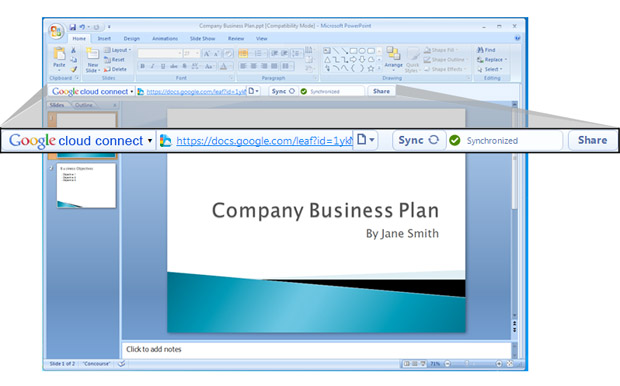Google gets appy with Microsoft Office

The cloud is coming to Microsoft Office and it's powered by Google.

(Credit: Google)
Google's latest effort to lure business customers away from Microsoft Office to Google Apps comes in the form of a plug-in for Word, Excel and PowerPoint. The plug-in essentially syncs Office files with an online counterpart that lives in Google Docs, which allows users to always see the most recent version of a file, whether they're viewing it in a browser, in an Office app or even on a mobile device.
That means no more emailing a Word document between multiple people, only to be confused about which is the most recent. It means being able to see, in real time, as your colleague updates the sales figures in your spreadsheet — while you're working on it. It means being able to literally drop an image into your colleague's PowerPoint presentation.
And, to sweeten the pot, the company is also launching a 90-day "Appsperience" program, which allows companies to test the waters, if you will, with Google Apps. For a fee — US$7000 for companies with less than 500 employees and US$15,000 for those with more — the company is providing use of the Apps, as well as access to a support network, as well as a new analytics dashboard that compares usage in the cloud against usage on legacy apps and more.
It's almost like an overdue coming-of-age realisation for Google, an acknowledgement that Microsoft's install base is so massive that companies needed a smarter way to transition to Apps. The company has been gaining ground with its Apps offerings — as well as enhancing its suite — for years. But it has struggled to sell some companies, including larger, more traditional companies, on the benefits of web-based apps.
With this plug-in — which is free to all Google Apps customers, including free customers — Google is providing a bridge of sorts for companies that are still on the fence, those that have been thinking about taking the plunge but have been deterred by thoughts of retraining an entire workforce on a new spreadsheet application.
Google obviously wins when the business customer signs on the dotted line and starts paying that annual US$50 per user fee. The old school employees win because they get to take advantage of the latest collaboration tools without having to let go of their comfortable legacy apps. And Google's new business customer wins not only because of Google's cost savings but also because collaborative employees tend to be more efficient and productive.
The only question left is: where does that leave Microsoft? In all truthfulness, it leaves Microsoft with another injection of a slow-release venom, one that's quietly killing off a long-standing cash cow for the company. Certainly, Office won't just disappear tomorrow or anytime sooner. But how long can it stay dominant — or even relevant — now that Google is providing the tools to transition away?
Via ZDNet US